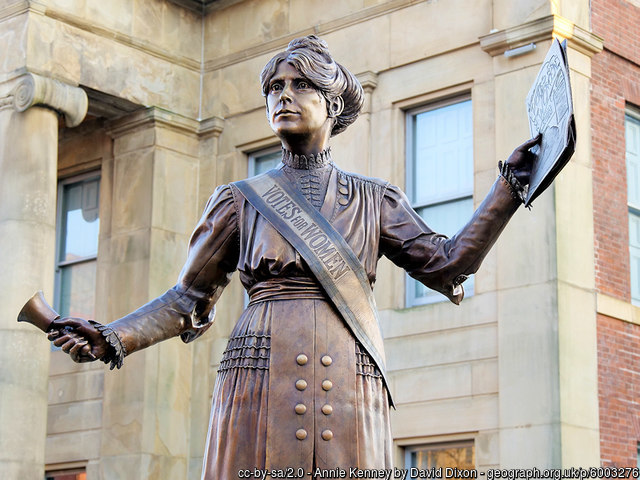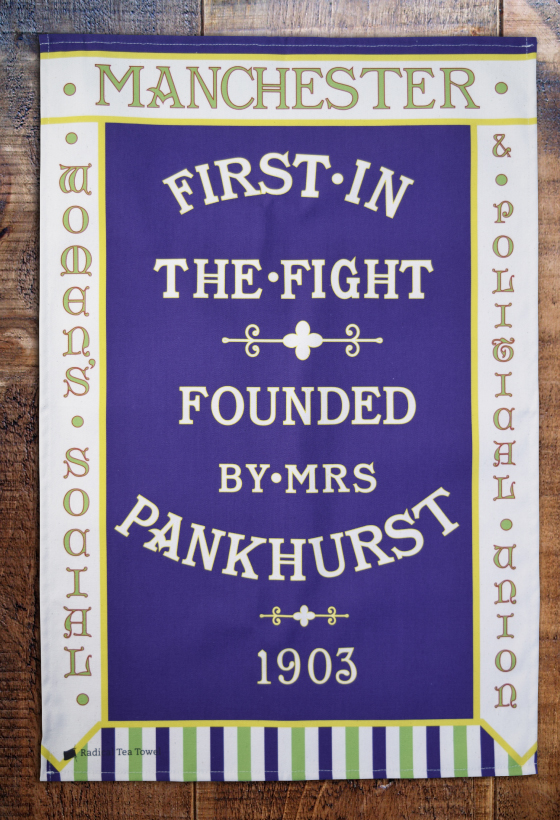Annie Kenney and Radical Manchester: A City of Protest
Posted by Pete on 13th Sep 2019
The birthday of suffragette Annie Kenney is a good time to reflect on the Radical History of Manchester and the North West – a longtime bastion of progressive politics in the UK.
Today marks 140 years since the birth of Manchester feminist legend Annie Kenney.
She grew up to be a working class hero of the suffrage movement in early 20th century Britain, enduring prison as she fought for the vote with her comrades in the Women’s Social and Political Union.

But Kenney represents just one chapter in the long and noble story of radical politics in Greater Manchester.
The Radical City: Manchester's History of Resistance
Kenney was far from the only Mancunian suffragette. Home to the Pankhursts, Manchester was in many ways the hub of first-wave feminism in the UK.
But look beyond the city’s formidable feminist heritage, and Manchester is also pretty hard to avoid throughout the rest of Britain's Radical History.
Peterloo – the breaking dawn of our national struggle for democratic freedom – was inflicted on and endured by Mancunian workers in 1819.
Richard Cobden and John Bright then made the city their base as they led the struggle of radical liberalism through the middle decades of the 19th century, pushing for political democracy and cheaper food prices for the poor.
By the 1840s, Manchester was home to Friedrich Engels, who used the horrific poverty of the city's working class as evidence for his seminal study, The Condition of the Working Class in England.
Read by his compatriot Karl Marx, Engels' book – and the Mancunian workers behind it – became fuel to the socialist fire of Marx’s critique against industrial capitalism in the 19th century.
Into the 20th century, Manchester continued to set the pace for radical politics in Britain, with huge protests like the Kinder Scout Mass Trespass and the 1945 Pan-African Congress, which saw major activists like Kwame Nkrumah call for decolonisation in Africa.
Radical Cities and Delayed Recognition
Manchester's Radical History is finally beginning (at long last) to get the recognition it deserves.
Last year, to mark the centenary of women getting the vote in Britain, statues of Kenney and Emmeline Pankhurst went up in Oldham and Central Manchester, respectively.
The former was funded by a grassroots citizen initiative, The Annie Kenney Project, which surely would have made Kenney herself proud.

And that was followed this year by a powerful new monument to Peterloo in the centre of the city.
I often say to our US readers that Chicago, from the Haymarket Eight martyrs of the American labour movement to working class agitator Emma Goldman, is impossible to miss when navigating the history of rebellion and progress in the United States.
Manchester is the same for us here in Britain – a fiery, passionate hub of Radical History.
Not Just Manchester: Radical History is Everywhere
But Manchester's radical roots to one side, it’s important to remember that there’s a history of progressive struggle wherever there’s a history of human beings.
In Manchester, Chicago, or anywhere else, Radical History is all around us.
Because there’s no place without, well, people – people like Annie Kenney, burning with a passion for social, political, racial, and economic justice.
From Glasgow’s ‘Red Clydeside’, to London’s place in the Suffragette struggle (which we’ve memorialised in a beautiful new map of the capital), in every town there's a tale of human beings standing up in the face of marginalisation and oppression.
As we grapple with the various 21st century despots and their wannabes seeking to roll back progress in today's world, it's more important than ever to let this history be our guide.
